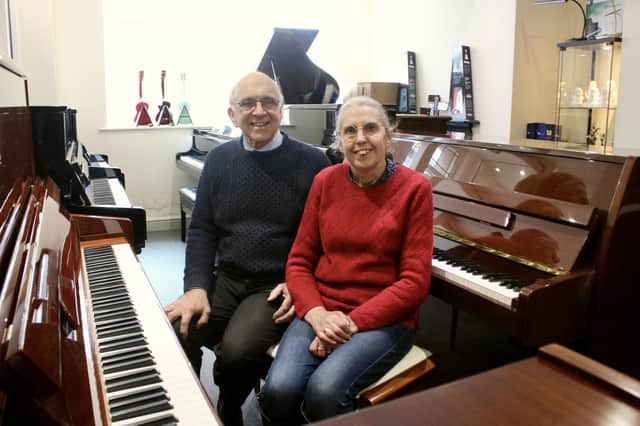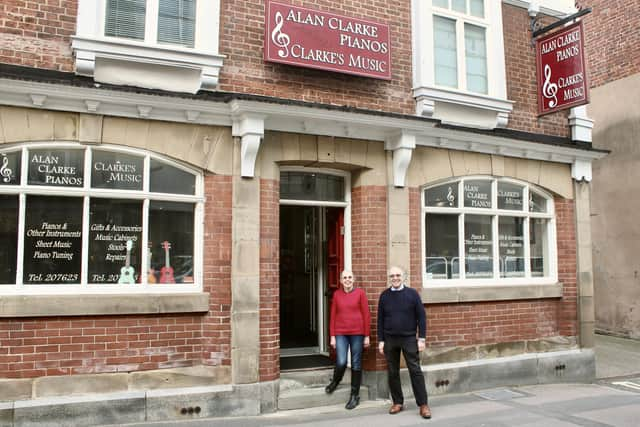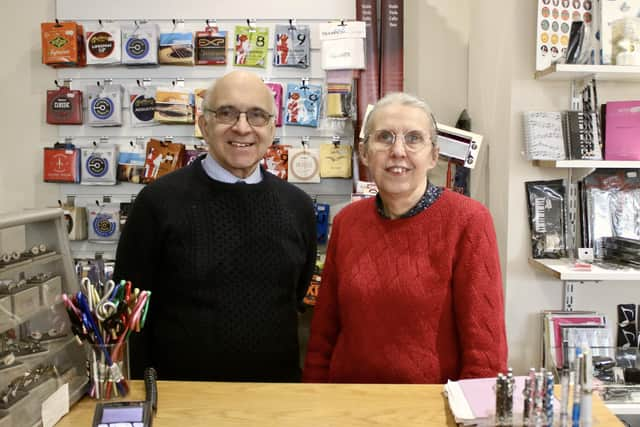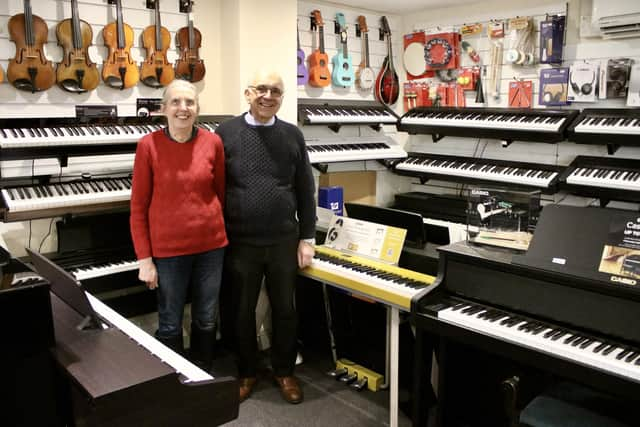Watching Jimi Hendrix at the ABC to working at Hudson's - a Chesterfield music shop in the key of keeping on


Alan Clarke shrugs, says he went to the concert with his elder brother, then laughing says “He only took me because he had a ticket and somebody else didn’t want to go”.
Alongside his wife Sue, Alan runs their two businesses Clarke’s Music and Alan Clarke Pianos on Saltergate. We chat amongst a gaggle of impressive pianos, straddled by a wall of ukuleles, a rack of brass instruments, woodwind, mandolins, violins, tin whistles, and a swathe of sheet music from old school to modern pop.
When asked how this all came together, Alan smiles.
Advertisement
Hide AdAdvertisement
Hide Ad

“From school as an apprentice, I used to work at Hudson’s in Chesterfield. The people that taught me worked in piano factories actually making pianos, and they set me on as an apprentice. Which lasted about seven years. I ran their workshop eventually.”
“Mr Hudson persuaded me to have a go on my own when he retired. That was Stan, and his son Keith was running the rest of the business. I had a little shop on my own and started from there.”
This was 1989. Sue adds “That was just pianos then”. Alan and Sue also got married in ’89, after meeting at a club called “18 Plus” that did “activities, and they’d have nights and parties and discos,” says Alan.
“Then we moved premises to this shop here, which was a lot bigger. Hudson’s had just gone, and there was a place in the market for a music shop,” says Alan. “Clarke’s Music shop began in 2006,” adds Sue.
Advertisement
Hide AdAdvertisement
Hide Ad

To explain, Clarke’s Music is the instrument and accessories side of the business, Alan Clarke Pianos is the fixing and tuning and everything piano. So… why music?
“I was always interested in music, and anything practical,” says Alan. “Engineering and making things, repairing things. It is just me, it is my life. Tools, machines. We also manufacture piano stools. Music cabinets. We buy the timber and machine it all.”
Alan takes us a little walk around the shop, taking a seat at every other piano, deftly playing soft jazz melodies, underlining the difference of each piano’s distinct and personal sound.
Sue underlines the importance the couple see in quality and care. “Good instruments that are going to last, that’s the thing. Reconditioned so they’re going to last them many years.”
Advertisement
Hide AdAdvertisement
Hide Ad

“Set up correctly so they work properly. And that’s a big thing. Even new pianos, you can’t just buy them in and send them out, you need work on them, which people don’t realise.”
“Every piano is different,” says Alan. “The tone of a piano. Sometimes a piano can come out of a factory where some areas of the piano, or odd notes, are very strident. So you take that down so it blends with the rest of the piano. Take the harshness away to a nice rounded sound.”
Alan explains the weight of a piano is not particularly from the wood, but the insides. And looking inside a piano is quite wow. So, sometimes you take these to bits? Alan nods.
“We completely rebuild. Which actually means taking everything out the piano. All the strings off, the iron frame out, sometimes repairing the sound-board, making new bridges. New rest-points, which is the piece of wood that holds the tuning pins.
Advertisement
Hide AdAdvertisement
Hide Ad“All the strings together on just a little upright, the string tension can be twenty-three tonnes. Up to thirty tonnes on some. That is why there’s a cast iron frame, which is why pianos are known for being heavy.”
Again, wow. Behind Sue is the opposite of chunk: a wall of little ukuleles. Are ukuleles popular? Sue nods emphatically. “Oh yes, very popular!”
Alan explains. “They've largely replaced the recorder in school. Because with a ukulele, you strum it, you sound as good as anybody else. With a recorder, to play it well, you’ve got to have a lot of breath control.” Alan pauses, laughs. “Children just want to blow it as hard as they can.”
And is it hard running your own business as a family? Sue scoffs at the idea of nine to five and done. Alan smiles. “We’re very busy. Work all hours. Running your own business, you have to.”
Advertisement
Hide AdAdvertisement
Hide Ad“In an evening, if we’re not delivering, doing a job that needs to be done for a repair or something, we’re in our workshop machining timber and manufacturing piano stools and parts and music cabinets.”
“And having a shop, you never know at what time or day of the week someone is going to come through the door. That’s why a lot of small shops fail because they think ‘Oh, it’s quiet on a Tuesday’ and they close. But you just never know.”
“I remember once, the hottest day of the year, I didn’t expect anyone to come and buy a piano, but someone came in and bought the most expensive piano in the shop!” Alan pauses. “We’ve not had a holiday for several years.”
And if you had a time machine, where would you go? “Probably back to when our children were younger,” says Alan. “See if I could spend more time with them… Because I was usually working.”
Advertisement
Hide AdAdvertisement
Hide Ad“Think I would have liked to see more of the world,” says Sue.
Their dedication for what they do is obvious. The reason they’re still keeping on is clear. “Each individual customer gets what ever they need to get the right decision to buy the instrument that’s going to be right for them,” says Sue.
“Sometimes it’ll take five minutes, sometimes it’ll take two hours, but different people are different,” she adds. Alan laughs. “We once spent two years at various times getting the right piano stool for someone!”